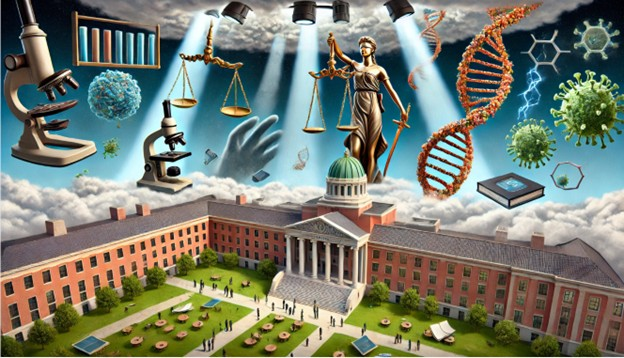Funding as Leverage: How the Trump Administration Is Reshaping Higher Education
Input
Modified
A Crackdown Fueled by Protests and Politics Students and Science Caught in the Crossfire The Stakes for Academic Freedom and the Future of Research

A Crackdown Fueled by Protests and Politics
When University of Miami student Jackson Kuster secured an internship with the U.S. Nuclear Regulatory Commission over winter break, it was more than a line on a résumé—it was a lifeline. He had poured months into federal internship applications, and this was his only offer. It would have opened doors, built connections, and led to a promising career in public service. But that door slammed shut almost as quickly as it opened.
Just weeks after his interview, a blunt message landed in his inbox: his internship had been rescinded. The cause? President Donald Trump’s sweeping 90-day federal hiring freeze, a centerpiece of his second-term initiative under the newly formed Department of Government Efficiency, led by Elon Musk. The executive order behind the freeze was part of a broader campaign to reduce the size of the federal government, cut billions in grant funding, and overhaul federal employment structures.
“I read through the entire executive order when it came out, and I was like, this isn't looking good for me,” Kuster said. “When I got the email, I wasn't shocked. I was mostly disappointed.”
His disappointment was mirrored across the country. Thousands of students, some on the verge of internships or entry-level government jobs, saw their future plans unravel. University hiring partners backed away, research labs paused projects, and graduate programs started to freeze admissions. The administration’s decisions, fueled by ideological motivations, were beginning to leave deep scars—not just on bureaucracies, but on young lives.
At the center of the administration’s efforts was a claim: colleges and universities were not doing enough to combat antisemitism. Amid rising campus tensions following the outbreak of the Israel-Hamas war in October 2023, student protests, particularly those supporting the Palestinian cause, had intensified. Some turned into encampments. Others, into arrests. Universities like Brown, Columbia, and Princeton became epicenters of both activism and federal scrutiny.
In early April 2025, news broke that the Trump administration was reviewing over $510 million in federal grants and contracts to Brown University. The justification: concerns over the university’s DEI policies and its handling of alleged antisemitic incidents. Brown officials responded with caution, saying they had received no official notice and could not substantiate the reports. But for students, the message was already clear.
“I’m a student who relies on financial aid,” one Brown sophomore said anonymously. “My income and livelihood are based on federal funding. This was shameful and it made me scared.”
For Jewish students, the experience was even more fraught. One junior said he felt used—his identity turned into a political pawn. Daniel Solomon, chair of Brown’s student committee on antisemitism, argued the freeze was misguided. “Brown has worked diligently and earnestly to counter antisemitism,” he said. “This is an unfounded attack on Brown and, by virtue, its Jewish community.”
Brown wasn’t the only university on the chopping block. A multi-agency task force announced it was reviewing $8.7 billion in federal grants and $256 million in contracts with Harvard University. Columbia University had already lost $400 million in research funding. At Princeton, research grants from agencies like the Department of Energy, NASA, and the Department of Defense were abruptly suspended—though the total amount, possibly $210 million, remained unconfirmed.
Other universities faced different lines of attack. The University of Pennsylvania saw $175 million in federal support suspended over its policies on transgender athletes, precisely a 2022 case involving a transgender swimmer. The university, however, maintained that it followed NCAA and Title IX guidelines that were in effect at the time.
Even programs aimed at increasing diversity in academia were targeted. The Department of Education opened civil rights investigations into 45 universities involved with The PhD Project, which supports minority students pursuing business doctorates. The administration argued the program’s race-specific criteria violated anti-discrimination laws, despite it recently opening membership to all applicants. Across all these cases, the administration’s strategy was clear: financial support would now be contingent on ideological compliance.

Students and Science Caught in the Crossfire
While elite institutions found themselves navigating lawsuits and federal audits, students like Kuster bore the immediate cost. The sudden loss of federal internship opportunities left him without summer employment—without the launchpad he had counted on.
The same held true for Addie Murphy, a University of Miami health science major who had just completed onboarding to become a research assistant at the Miami Veterans Association. The position would have offered her a chance to work directly with patients while earning income. But like Kuster, Murphy received a cancellation notice. The job was gone. Although she continues to volunteer in the lab, her credentials, pay, and responsibilities were stripped.
“I was very nervous about what this meant,” Murphy said. “I love my position and love getting to do research.”
Meanwhile, graduate programs across the country braced for more uncertainty. Universities like the University of Pittsburgh, USC, and Vanderbilt began slowing or even reversing doctoral admissions. The reason? A pending Trump administration plan to cap NIH indirect costs at 15%, a change that would gut operational support for labs and research infrastructure. Though currently blocked in court, the proposal had already spooked institutions and rattled prospective students.
At UM, sophomore Victor Jaimes watched with growing dread. He dreamed of pursuing a Ph.D. in mathematics, but stories of students being waitlisted or accepted only to be later rejected made him reconsider. “That’s something I’m worried about,” he said. “If the funding issue isn’t fixed, I might have to leave to study elsewhere.”
The numbers underscored the stakes. In the previous year, UM received more than $192 million in NIH funding. Florida International University took in nearly $40 million. These funds don’t just sustain labs—they pay graduate stipends, support faculty, and fund life-saving research.
Even students who had secured summer research opportunities were forced to pivot. One UM student, who asked to remain anonymous, lost his spot in a cancer and infectious disease lab at the NIH. Now, he’s looking outside of academia, trying to find a foothold in the private sector.

The Stakes for Academic Freedom and the Future of Research
What began as a pledge to root out antisemitism has expanded into a full-fledged reordering of the federal government’s relationship with higher education. Through a combination of funding freezes, hiring bans, and policy crackdowns, the Trump administration is signaling that academic institutions must fall in line—or pay the price.
Critics—including faculty unions, university associations, and legal scholars—warn that this approach jeopardizes free speech, violates due process, and threatens to undermine American research leadership. The American Association of University Professors and the American Federation of Teachers have already sued, accusing the government of coercion. The Association of American Universities called the withdrawal of research funding for political reasons “dangerous and counterproductive.”
But legal battles take time, and time is not on the side of students already reshaping their futures. For Jackson Kuster, the hiring freeze may have erased an internship, but not his ambition. For Addie Murphy, the loss of paid work hasn’t stopped her from showing up to the lab. And for Victor Jaimes, the hope of pursuing a Ph.D. persists, even as the path narrows.
Still, the message from Washington is clear: **public support is now political currency**. and as universities weigh their principles against their funding, a generation of students, scientists, and scholars waits—caught in the crossfire of an ideological war they never asked to fight.





















